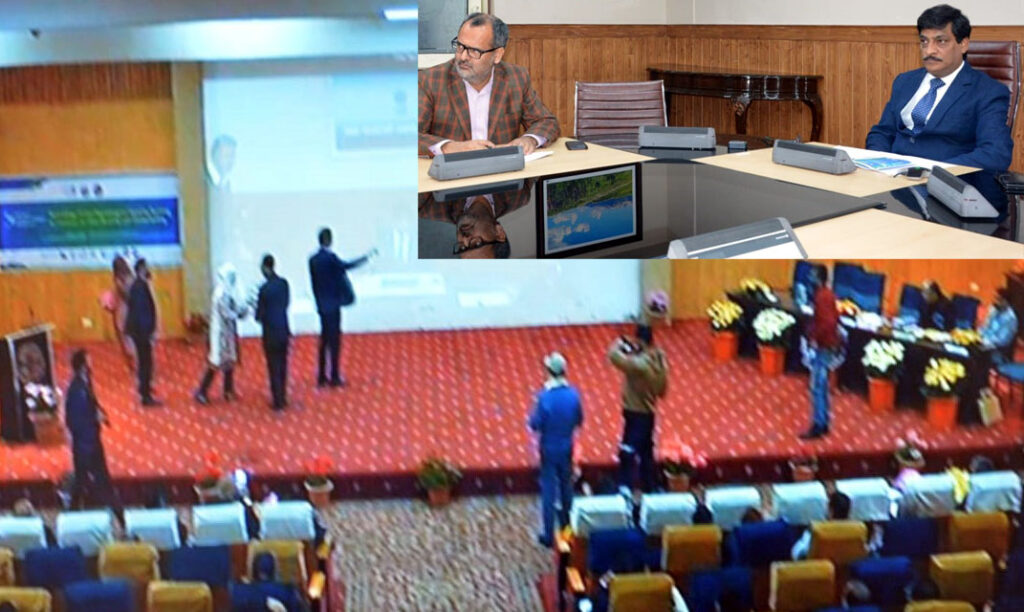Technology to be enabler in attaining sustainability in food production: CS
Says J&K is going to be 2nd to none in adopting advanced technology and practices in Agriculture

SRINAGAR, May 3: Chief Secretary, Dr Arun Kumar Mehta today remarked that our Research Institutions including that of Agricultural Universities should be ready to embrace future technological innovations and modern practices.
Dr Mehta was speaking in the inaugural session of the 3-Day SAPI Annual Conference & Symposium held on the theme ‘Technology driven physiological capacity building in livestock for food security and sustainability (SAPICON-2023)’ at Sher-e-Kashmir University of Agricultural Sciences & Technology (SKUAST) here.
On the occasion the Chief Secretary applauded the organizers of the conference for conducting it on such a significant theme. He said that such conferences are necessary for building capacities of students, faculty as well as scientists to ensure their readiness for future challenges. He sensitized the participants of the conference that if they are not ready to accept the challenge of investing in technology somebody else is going to do so and leave them behind.
Dr Mehta advised the Agricultural University to draw an action plan based upon the suggestions of experts and scientists to tackle future problems. He impressed upon them that the future is going to be technology and knowledge driven and there is need to prepare for accepting the challenges.
Elucidating he maintained that the technologies like gene editing and gene splicing are becoming modern realities now. He said that the days are not far when the world would see production of meat and other products in manners that may look like fiction today. He stated that many technological advances we witness currently were unthinkable of just few decades back. He urged that undue resistance to change is not the optimal way forward. Being carful but not being paralysed holds the key to prosperous future.
The Chief Secretary further recalled that from the last couple of years J&K has made big strides in adoption of modern technology even in governance and offering of different services to public. He reiterated that J&K is going to be 2nd to none in swiftly adopting the modern technology, tools and methods to attain sustainability in food production and livestock development either.
He called the conference significant and timely when the population of the world has surpassed the mark of 7 billion and is ever increasing. He made out that technology is going to play a major role in ensuring food and nutritional security for world population in the years ahead. He maintained that none can afford to be technologically impaired.
As far as the progress of agriculture in the UT is concerned, the Chief Secretary remarked that we have earmarked a robust plan of Rs 5000 Cr for development of agriculture here. He observed that the important programmes like attaining sustainability in mutton, poultry, fish, wool, fodder production mentioned here should be our focus areas as around 40% of our agricultural income consists from that of livestock farming.
During the conference it was given out that in view of ever increasing world population the food and nutritional security with zero hunger goals poses a challenge for us. It was revealed that livestock accounts for 40% of global agricultural GDP, provides over 33% of the world’s protein intake and 7% of global kilocalorie consumption. The demand for meat and milk in 2050 is projected to grow by 73% and 58% respectively.
It was therefore envisaged that the precision, smart livestock farming is inevitable that must integrate all the techniques, skills, knowledge and innovations to produce safe, sufficient, affordable, accessible and sustainable animal food with minimum environmental impacts. So the future livestock farming must be technology driven farming, as was added during this conference.
Present theme of the conference is aimed to provide some leads using available advanced technologies like IoT, AI & ML, next-gen biotechnological tools in livestock farming to make it more smart, efficient, resilient, environment friendly and sustainable.
The conference is going to provide platform to scientists, researchers, students, entrepreneurs, management personnel, extension workers, planners, decision makers and other stake holders from all over the country and abroad to share expertise and experiences, discuss issues and concerns related to traditional methods of livestock farming. It would encourage them to suggest strategy to overcome the constraints for augmenting safe, nutritious, clean, affordable and accessible livestock production. This conference will also open up frontier areas of research to scientists and technocrats to augment the smart livestock production imbibed with socio-economic issues.





